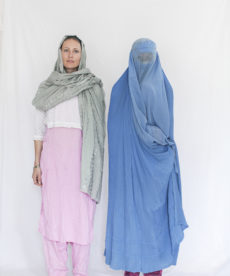 Véronique De Viguerie has travelled the world and photographed some of the most dangerous conflict zones. Her work has been printed in many major publications and exhibited internationally.
Véronique De Viguerie has travelled the world and photographed some of the most dangerous conflict zones. Her work has been printed in many major publications and exhibited internationally.
She has documented the Taliban in Afghanistan, pirates in Somalia and rebels in Nigeria.
And she has done so while raising two children.
Braving physical danger and the emotional pain of regular separation from family, she has shown us that it can be done, all the while producing indelible images that get to the humanity that so often gets battered in battle.
We met with Véronique, and asked her what makes her run.
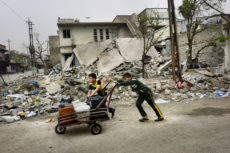 What brought you to photojournalism?
What brought you to photojournalism?
I originally wanted to join the military. I discussed it with my parents who were not very happy about it. My father said that if I wanted to join the military, then I should at least get a bachelor’s degree, to be an officer. I chose law. Somewhere along the way, I lost interest in the military and steered myself towards journalism
So right from the start you were drawn towards dangerous environments?
I used to say I’d want to be either an officer or a traveler, but travelling’s not a job. I really wanted to explore other cultures. When I was studying for my law degree, I read a book about this woman photographer, and I had a revelation then, that was what I wanted to do. It combined everything I wanted to do: self-expression, exploration, discovery…
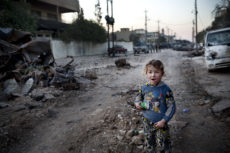 What was it that drew you towards extreme situations?
What was it that drew you towards extreme situations?
I’ve always been attracted to extreme things and extreme people. Extreme sports, sky diving, free ride snowboarding, kite surfing, partying… I don’t like reasonable. In conflict zones, everything is more extreme. People are pushed to their limits. It’s more intense and I love that intensity. It’s what I’ve always been after: an extreme intensity. I found what I was looking for in reporting from conflict zones.
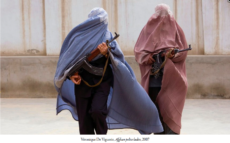 Tell me about your first freelance assignment in Afghanistan.
Tell me about your first freelance assignment in Afghanistan.
After I received my Master’s of law, I told my parents that I no longer wanted to join the military, but wanted to become a photographer instead. I chose to go study photography in London, as I really wanted to learn English. Once I had my degree in hand, I was hired by a local newspaper, the Lincolnshire Echo. In 2003, they sent me to Afghanistan for the first time. I stayed there 15 days and truly fell in love with the country. I was frustrated when I had to leave.
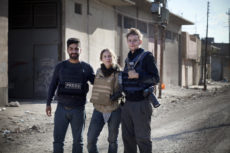 Six months later, I left the newspaper, and I travelled back to Afghanistan as a freelancer, with a loan from my grandmother, a laptop computer and a camera I had won in a contest. I had originally planned to stay three months and ended living there for three years.
Six months later, I left the newspaper, and I travelled back to Afghanistan as a freelancer, with a loan from my grandmother, a laptop computer and a camera I had won in a contest. I had originally planned to stay three months and ended living there for three years.
At first it was hard. I must have sold three pictures in the first three months. I had trouble getting my foot in the door with editors, and I worked as a waitress in a French restaurant in Kaboul in exchange for bed and board. Very slowly, I parlayed the occasional pictures into real relationships with editors, and it was probably about a year before I got my first real assignment from a magazine.
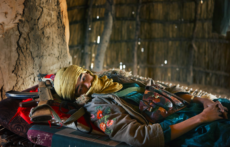 Do you follow a specific method to establish a rapport with your subjects?
Do you follow a specific method to establish a rapport with your subjects?
With the Taliban it took a very long time to set it up; at the time the Taliban were not talking to the press, even local. Everyone was talking about them when I first arrived, but no one had met with them. Everyone knew about the pre-2001 Taliban, but this new generation was unknown. I immediately set up meetings with various fixers, and it took two years for one of them to tell me he had met a Taliban leader who would be willing to meet to the press. But then he told me he would not talk to women…
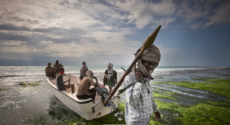 I took advantage of the Afghan custom of “Pashtun wali”, meaning when you come to another person’s home, they must welcome you and protect you. So our fixer took me and two other journalists to meet with this Taliban leader, but did not tell him ahead of time that two of us were women. And the Taliban accepted to meet with us only because he knew the fixer and the fixer’s family well.
I took advantage of the Afghan custom of “Pashtun wali”, meaning when you come to another person’s home, they must welcome you and protect you. So our fixer took me and two other journalists to meet with this Taliban leader, but did not tell him ahead of time that two of us were women. And the Taliban accepted to meet with us only because he knew the fixer and the fixer’s family well.
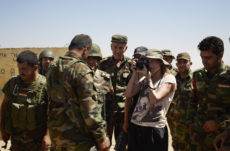 At what point did you feel secure enough to take your camera out?
At what point did you feel secure enough to take your camera out?
One big unknown was how the Taliban would react when they discovered we were women. My colleague, Manon Querouil and I wore burkhas in the car on the way to the Taliban, surrounded by four motorcycles with two Taliban each as escorts. I desperately wanted to take my camera out, especially as the sun was slowly setting, but the fixer insisted that I wait and stay hidden in my burkha.
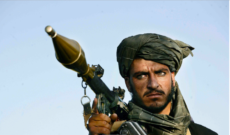 They took our cell phones when we arrived at prayer time, and our fixer went to talk to our contact, Mullah Najib. We waited patiently and with some trepidation. I watched the sunlight ebbing, fearing that I lose all the light before I could take a single picture. Eventually Mullah Najib agrees to see us, and I’m able to take three pictures in the last minutes before night falls.
They took our cell phones when we arrived at prayer time, and our fixer went to talk to our contact, Mullah Najib. We waited patiently and with some trepidation. I watched the sunlight ebbing, fearing that I lose all the light before I could take a single picture. Eventually Mullah Najib agrees to see us, and I’m able to take three pictures in the last minutes before night falls.
We stayed overnight in a Taliban’s home as our car had broken down upon arriving. At the Taliban’s house, we found ourselves with a bunch of younger men who were all playing with their cell phones, downloading Britney Spears rings on their phones. We smoked cigarettes with them and built a rapport.
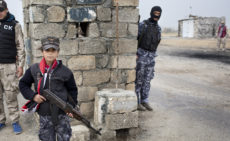 We woke up the next day to a tense atmosphere: American soldiers were patrolling the area, and the Taliban suspected us of having given the coordinates of their camp away. If the Americans attacked, we would likely be killed. Even the fixer started to suspect us. It was only three hours later the Mullah Najib came to get us and told us the Americans had left.
We woke up the next day to a tense atmosphere: American soldiers were patrolling the area, and the Taliban suspected us of having given the coordinates of their camp away. If the Americans attacked, we would likely be killed. Even the fixer started to suspect us. It was only three hours later the Mullah Najib came to get us and told us the Americans had left.
Since our car had broken down, we had to ride motorcycles in our burkhas. We fell off upon arriving at the camp and that amused them tremendously, which allowed us to break the ice. As a result they let me take the pictures I wanted.
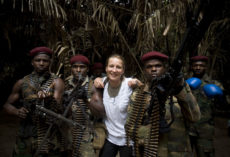 I expected to meet cold blooded killers and in fact I met a bunch of teenagers who were into cell phones and video games. I find it hard to imagine these boys killing someone.
I expected to meet cold blooded killers and in fact I met a bunch of teenagers who were into cell phones and video games. I find it hard to imagine these boys killing someone.
I was able to create a rapport with them because they are so rarely in contact with woman, besides the ones in their families, so they were very curious to interact with us. It was almost as if we were of a third sex…
I imagine your goal then is to become invisible?
Yes it very much is. Which is very hard to do when you’ve become the main attraction. But eventually that starts to wane. We made ourselves as uninteresting as possible, and they went back to their everyday business after a while, so I was able to take pictures all afternoon.
Interestingly, it’s much harder to get to that point nowadays when everyone has smart phones. Everyone wants to take selfies and everyone wants to pose.
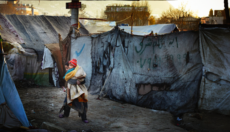 When you go on assignment, do you leave with a specific idea in mind as to what you want to show?
When you go on assignment, do you leave with a specific idea in mind as to what you want to show?
Increasingly I do. I used to be much more spontaneous, but I came to realize that having a clear focus helped me to get the pictures I want. Especially as the mother of two little girls, I want to limit my time away, so I need to be able to get straight to the point. I land with what I call my “Christmas list” of stills I really want to get, but then again, you do also have to stay open to the moment.
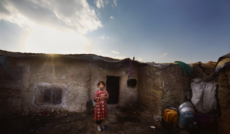 What made you decide to go on assignment when you were six-months pregnant?
What made you decide to go on assignment when you were six-months pregnant?
The first time I went on assignment to South Sudan (non-pregnant), we met a young woman who had been a sex slave of Kony, the head of the Lord’s Resistance Army. She was only 19 years-old and she told us about how she escaped while 8 months pregnant, into the jungle, with no water and no food. She walked endlessly for days and slept on the bare soil. So when I was 5 or 6 months pregnant and I decided to go, I thought of her and her escape. I thought to myself that if she had been able to escape in these conditions, surely I should be able to do it in much more comfortable conditions. We are women, made of flesh and blood just the same. So we should be able to withstand the same things.
How have you adjusted your approach to your work as you became a mother?
I definitely now choose to leave for your shorter amounts of time and I do a lot more prep work. But that also has to do with production budgets decreasing over the years.
When I leave, it’s almost as if I’m putting on a new costume. I’m no longer a mom, I’m a photojournalist. I can skype with my kids in the evenings, and yet completely put this part of my life aside when I’m at work.
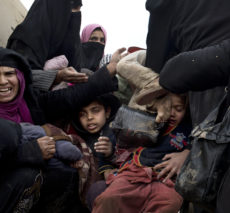 For example, I found myself in Mosul, and found I was able to take pictures of human suffering and remain objective, not immediately have it relate to my own life. It’s very schizophrenic: I find it very hard to leave my family when I have to, and I cry, and I leave gifts for them, but once I land on assignment, I’m able to get into a completely different state of mind and focus on the work at hand.
For example, I found myself in Mosul, and found I was able to take pictures of human suffering and remain objective, not immediately have it relate to my own life. It’s very schizophrenic: I find it very hard to leave my family when I have to, and I cry, and I leave gifts for them, but once I land on assignment, I’m able to get into a completely different state of mind and focus on the work at hand.
Are you able to keep these two lives separate?
It used to be when I came back home from assignment, I needed a decompression airlock – a few nights in a hotel to readjust. But nowadays I’m able to switch back pretty immediately, because my kids need me right away. I’ve found that my eldest daughter has started asking me questions about what I do. So now I’m figuring out how to bring my life as a photojournalist into my life as a mother, by explaining my work and the subjects of my photojournalism to my kids.
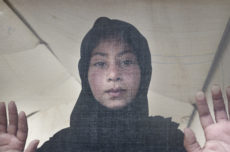 Are you tempted by assignments closer to home?
Are you tempted by assignments closer to home?
I am. But it’s harder to work in France because subjects are more suspicious of photographers and the media in general, so the results are far less spontaneous. In France, I often find myself having to answer for all the sins of the media. I also find that conflict zones bring out more extreme situations. Emotions are more extreme, more powerful, and that fascinates me.
– Yann Sobezynski
To see more of Veronique’s work : www.veroniquedeviguerie.com
















